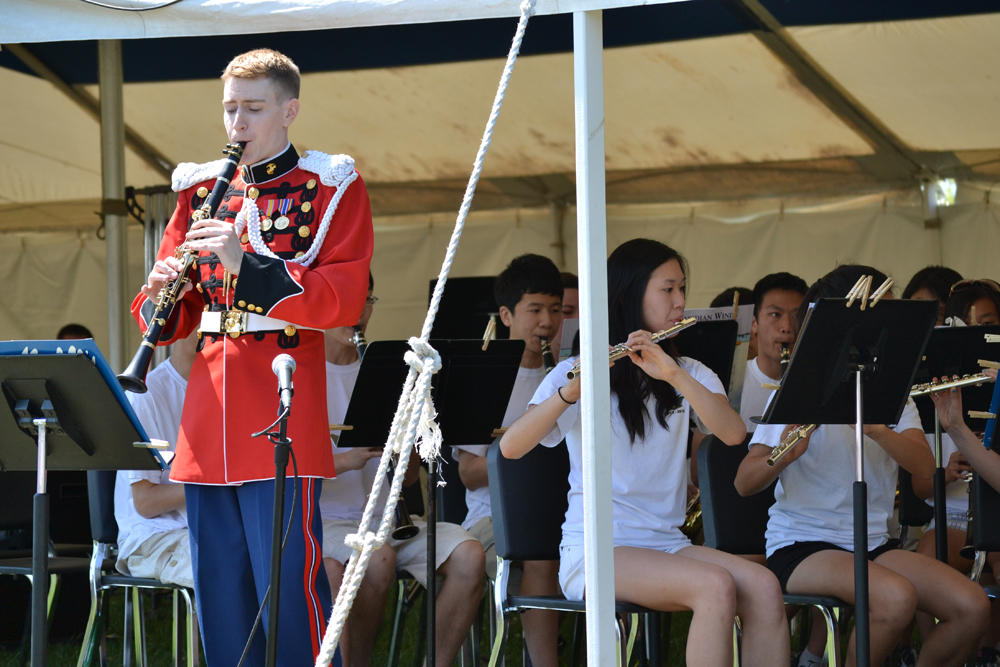
By Tara Cavanaugh
When the Ann Arbor Public Schools marks its centennial anniversary this fall, it’s not just celebrating 100 years of music education. It’s celebrating 100 years of music innovation and excellence that has helped other music institutions –such as Interlochen and the University of Michigan Marching Band– become what they are today.
Daryl Hurst, a Pioneer band alum and former president of the Parent Band Association, is the unofficial historian of AAPS bands. He spent seven years researching the history of music education in the district, and he published an article titled “Birth of the Bands” in the Ann Arbor Observer in 2006. (Click here for PDF version of the article)
Daryl says the first official Ann Arbor high school band was formed in 1914 and announced in an Ann Arbor News article. The school had had just a few music clubs before then.
Another pivotal year for the band was 1934, when Joe Maddy came to town. “He brought with him an enthusiasm for teaching high school students in a more methodical manner, believing they could play at a higher level,” Hurst said.
“Then he had this crazy idea that music camp in the woods in upper Michigan would be cool,” Hurst continued. The Ann Arbor superintendent at the time, Otto Haisley, disagreed. After determining that Maddy, who also lead music education part-time at U-M, was spending too much time on his camp, Haisley fired him.
Turns out that music camp became Interlochen, a renowned music camp that now attracts young artists from around the world.
“It’s a very entwined history,” Hurst said.
In 1948, band director Clarence Roth contacted Maddy and asked to bring his musicians there for a camp in the summer. But Maddy wasn’t enthused about the idea.
“Maddy felt, there’s no one school that could possibly have the high quality program that he envisioned,” Hurst said. But when the students arrived, Maddy changed his tune.
“He was so impressed that the school truly had a program where all students could excel at the high level that they did,” Hurst said. So the high school became the first to have a true band camp experience that includes both marching and concert practice.
Another institution that grew alongside the Ann Arbor Public Schools band was the University of Michigan Marching Band.
In the late 1800s, an Ann Arbor High School senior marched into the President’s office and demanded a marching band. His request was granted. The U-M Marching Band and the Ann Arbor High band continued to develop together on and off over the years. From 1927 to 1928, Nicholas Falcone directed both the U-M band and the high school band, similar to Maddy’s double duty the three years prior.
The district is celebrating its history with a centennial concert at the end of the 2014 school year. Grammy-winner Michael Daugherty, who is also U-M professor and Pioneer band dad, has been commissioned to write a piece that will be performed by student musicians from the three high schools.
“We really do relish the history,” said Pioneer Band Director David Leach. “I think it’s important that we honor that past.”
In recent history, Hurst points out, people were worried that the music program would be diluted when Huron was formed in 1969. “Instead, we ended up with two outstanding music programs. Huron has been named a national signature Grammy school just like Pioneer has. And with Skyline, I think the same thing is happening now. We’re starting to see that program form.”
Even though Maddy was innovative with music education and in forming Interlochen, he tended to believe only a select few students could play at a high level. The Ann Arbor Public Schools music program that has developed since then has certainly proved him wrong.
“I think it’s much more about giving the kids the opportunity with the right leadership,” said Hurst. “And then you’ll have a great program.”
Related on the AAPS News


Be the first to comment